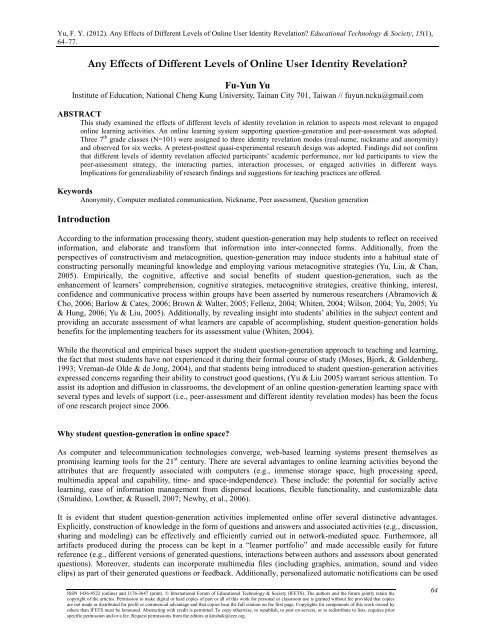January 2012 Volume 15 Number 1 - Educational Technology ...
January 2012 Volume 15 Number 1 - Educational Technology ...
January 2012 Volume 15 Number 1 - Educational Technology ...
You also want an ePaper? Increase the reach of your titles
YUMPU automatically turns print PDFs into web optimized ePapers that Google loves.
Yu, F. Y. (<strong>2012</strong>). Any Effects of Different Levels of Online User Identity Revelation? <strong>Educational</strong> <strong>Technology</strong> & Society, <strong>15</strong>(1),<br />
64–77.<br />
Any Effects of Different Levels of Online User Identity Revelation?<br />
Fu-Yun Yu<br />
Institute of Education, National Cheng Kung University, Tainan City 701, Taiwan // fuyun.ncku@gmail.com<br />
ABSTRACT<br />
This study examined the effects of different levels of identity revelation in relation to aspects most relevant to engaged<br />
online learning activities. An online learning system supporting question-generation and peer-assessment was adopted.<br />
Three 7 th grade classes (N=101) were assigned to three identity revelation modes (real-name, nickname and anonymity)<br />
and observed for six weeks. A pretest-posttest quasi-experimental research design was adopted. Findings did not confirm<br />
that different levels of identity revelation affected participants’ academic performance, nor led participants to view the<br />
peer-assessment strategy, the interacting parties, interaction processes, or engaged activities in different ways.<br />
Implications for generalizability of research findings and suggestions for teaching practices are offered.<br />
Keywords<br />
Anonymity, Computer mediated communication, Nickname, Peer assessment, Question generation<br />
Introduction<br />
According to the information processing theory, student question-generation may help students to reflect on received<br />
information, and elaborate and transform that information into inter-connected forms. Additionally, from the<br />
perspectives of constructivism and metacognition, question-generation may induce students into a habitual state of<br />
constructing personally meaningful knowledge and employing various metacognitive strategies (Yu, Liu, & Chan,<br />
2005). Empirically, the cognitive, affective and social benefits of student question-generation, such as the<br />
enhancement of learners’ comprehension, cognitive strategies, metacognitive strategies, creative thinking, interest,<br />
confidence and communicative process within groups have been asserted by numerous researchers (Abramovich &<br />
Cho, 2006; Barlow & Cates, 2006; Brown & Walter, 2005; Fellenz, 2004; Whiten, 2004; Wilson, 2004; Yu, 2005; Yu<br />
& Hung, 2006; Yu & Liu, 2005). Additionally, by revealing insight into students’ abilities in the subject content and<br />
providing an accurate assessment of what learners are capable of accomplishing, student question-generation holds<br />
benefits for the implementing teachers for its assessment value (Whiten, 2004).<br />
While the theoretical and empirical bases support the student question-generation approach to teaching and learning,<br />
the fact that most students have not experienced it during their formal course of study (Moses, Bjork, & Goldenberg,<br />
1993; Vreman-de Olde & de Jong, 2004), and that students being introduced to student question-generation activities<br />
expressed concerns regarding their ability to construct good questions, (Yu & Liu 2005) warrant serious attention. To<br />
assist its adoption and diffusion in classrooms, the development of an online question-generation learning space with<br />
several types and levels of support (i.e., peer-assessment and different identity revelation modes) has been the focus<br />
of one research project since 2006.<br />
Why student question-generation in online space?<br />
As computer and telecommunication technologies converge, web-based learning systems present themselves as<br />
promising learning tools for the 21 st century. There are several advantages to online learning activities beyond the<br />
attributes that are frequently associated with computers (e.g., immense storage space, high processing speed,<br />
multimedia appeal and capability, time- and space-independence). These include: the potential for socially active<br />
learning, ease of information management from dispersed locations, flexible functionality, and customizable data<br />
(Smaldino, Lowther, & Russell, 2007; Newby, et al., 2006).<br />
It is evident that student question-generation activities implemented online offer several distinctive advantages.<br />
Explicitly, construction of knowledge in the form of questions and answers and associated activities (e.g., discussion,<br />
sharing and modeling) can be effectively and efficiently carried out in network-mediated space. Furthermore, all<br />
artifacts produced during the process can be kept in a “learner portfolio” and made accessible easily for future<br />
reference (e.g., different versions of generated questions, interactions between authors and assessors about generated<br />
questions). Moreover, students can incorporate multimedia files (including graphics, animation, sound and video<br />
clips) as part of their generated questions or feedback. Additionally, personalized automatic notifications can be used<br />
ISSN 1436-4522 (online) and 1176-3647 (print). © International Forum of <strong>Educational</strong> <strong>Technology</strong> & Society (IFETS). The authors and the forum jointly retain the<br />
copyright of the articles. Permission to make digital or hard copies of part or all of this work for personal or classroom use is granted without fee provided that copies<br />
are not made or distributed for profit or commercial advantage and that copies bear the full citation on the first page. Copyrights for components of this work owned by<br />
others than IFETS must be honoured. Abstracting with credit is permitted. To copy otherwise, to republish, to post on servers, or to redistribute to lists, requires prior<br />
specific permission and/or a fee. Request permissions from the editors at kinshuk@ieee.org.<br />
64

















